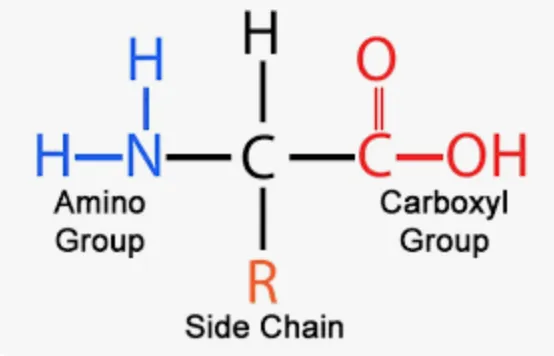Unveiling the Wonders of Amino Acids: Building Blocks of Health and Wellness

In the pursuit of a healthier and happier life, we often focus on diets, workouts, and wellness routines. But have you ever considered the tiny yet mighty players behind the scenes that make it all possible? Enter amino acids, the unsung heroes of your body's cellular processes. In this blog post, we'll explore the remarkable benefits of amino acids for your health and wellness.
Understanding Amino Acids
Before we dive into the benefits, let's start with the basics. Amino acids are the fundamental building blocks of proteins, and they play a pivotal role in countless bodily functions. These organic compounds consist of carbon, hydrogen, oxygen, and nitrogen, forming chains that create the proteins essential for life.
There are two main categories of amino acids: essential and non-essential. Essential amino acids are those your body cannot produce on its own, necessitating their intake through your diet. Non-essential amino acids, on the other hand, can be synthesized by your body. Together, they fuel the processes that keep you alive and thriving.
The Benefits of Amino Acids for Health and Wellness
Muscle Building and Recovery
For those pursuing fitness goals, amino acids are prized possessions. Among them, branched-chain amino acids (BCAAs), including leucine, isoleucine, and valine, stand out. These BCAAs are like the architects and construction workers of your muscle tissue.
During intense workouts, your muscle fibers experience micro-tears. BCAAs rush in to repair and rebuild these fibers, leading to muscle growth and improved recovery. Incorporating BCAA-rich foods like lean meats, fish, and dairy products into your diet can support your fitness journey.
Weight Management
Amino acids also play a significant role in weight management. Some amino acids can influence your appetite and metabolism, making them valuable allies in your quest to shed unwanted pounds.
Tryptophan, for instance, is known for its role in serotonin production. Serotonin is a neurotransmitter associated with mood and appetite regulation. A diet rich in tryptophan-containing foods like turkey, chicken, and nuts may help control cravings and support your weight loss efforts.
Phenylalanine is another amino acid that can affect appetite by promoting the release of cholecystokinin, a hormone that signals feelings of fullness. Incorporating phenylalanine-rich foods like lean beef, soybeans, and fish can aid in appetite management.
Mood and Cognitive Health
While you might not typically associate amino acids with your mood or cognitive function, they have a significant impact on both. Amino acids serve as precursors for neurotransmitters—chemical messengers in your brain that regulate mood, cognition, and behavior.
For example, tyrosine and phenylalanine are essential for the production of dopamine, a neurotransmitter associated with pleasure and motivation. Including tyrosine-rich foods like lean meats, fish, and tofu in your diet can contribute to overall well-being.
Similarly, tryptophan is a precursor to serotonin, which influences mood and can help alleviate symptoms of depression and anxiety. Incorporating tryptophan sources like bananas, oats, and eggs can help support your emotional health.
Immune System Support
A strong immune system is your body's first line of defense against infections and illnesses. Amino acids, particularly glutamine, are instrumental in bolstering your immune function.
Glutamine is essential for the production of white blood cells, which play a crucial role in your immune response. It also supports the integrity of your gut lining, preventing harmful substances from entering your bloodstream and potentially causing infections.
During periods of illness or recovery, your body's demand for glutamine increases. Therefore, consuming glutamine-rich foods such as dairy products, beans, and spinach can aid in strengthening your immune system.
Food Sources and Supplements
Now that we've explored the myriad benefits of amino acids, let's talk about how you can incorporate them into your daily life.
Dietary sources of amino acids vary, and they can be found in both animal and plant-based foods. Here are some examples:
- Animal Sources: Beef, poultry, fish, eggs, dairy products
- Plant-Based Sources: Legumes, tofu, quinoa, nuts, seeds
- BCAA-Rich Sources: Red meat, chicken, fish, dairy products
In most cases, obtaining amino acids through a balanced diet is sufficient for meeting your body's needs. However, in certain situations such as intensive athletic training, medical conditions, or specific dietary restrictions, amino acid supplements may be considered. It's crucial to consult a healthcare professional before adding supplements to your routine to ensure they are appropriate for your individual circumstances.
In the intricate dance of life, amino acids are the choreographers ensuring everything runs smoothly. From muscle growth to mood regulation, and from appetite control to immune system support, these tiny compounds have a profound impact on your health and wellness.
As you continue your journey toward a healthier, more vibrant you, consider the role amino acids play in your daily life. Whether you choose to obtain them through food or supplements, always prioritize balance, and consult a healthcare professional when in doubt. Your body will thank you with improved vitality and well-being.
If you found this information valuable, don't hesitate to share it with others who are on their own wellness journeys. Together, we can unlock the wonders of amino acids and pave the way to a healthier future.
